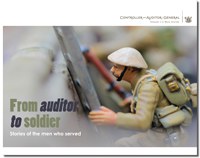Arnold Hore
Arnold Hore was from Central Otago. He was appointed to the staff of the Audit Department in May 1902.
In the 1907 annual examinations of the New Zealand Institute of Accountants, Arnold was placed first.
In 1910, the Institute of Accountants ran an essay competition on the topic of “Goodwill, its nature, and treatment in the accounts.” Arnold’s essay was awarded third place.
At the outbreak of WW1, he had attained the position of Audit Examiner, Class VI. He had passed the Senior Civil Service Examination and had qualified as an accountant. Arnold was the only qualified accountant working at the Audit Department.
He joined the New Zealand Expeditionary Force in February 1917, aged 31. Arnold was promoted to the rank of Corporal in July 1917 and sent overseas in March 1918. He landed initially at Suez and was hospitalised for two weeks with a suspected case of measles. He went on to the United Kingdom, and soon after arriving there in May 1918 he was again hospitalised, this time with influenza.
Arnold recovered and was sent to France on 8 October 1918 with the 2nd Battalion, Wellington Regiment. A day after arriving in France, he again fell ill, and was admitted to a hospital at Rouen. He was then sent back to the United Kingdom and admitted to the Royal Victoria Hospital on 16 October 1918.
After discharge from hospital, Arnold was transferred to the London office of the Army Pay Corps, in January 1919. He was promoted to the rank of Sergeant in August 1919 and discharged from the New Zealand Expeditionary Force in December 1919. He was awarded the Victory Medal and the British War Medal.
Arnold did not rejoin the Audit Department. He stayed in Britain and worked for the New Zealand High Commission Office as its auditor.
Initially, life in Britain went very well for Arnold and his wife. In 1921, he was elected as a Fellow to the United Kingdom Institute of Costs and Works Accountants, the first New Zealander elected to such a position. In 1924, Arnold and his wife were guests at a garden party at Buckingham Palace held by King George V and Queen Mary for people from the Dominions.
However, with the onset of the Great Depression in the late 1920s, life became difficult for Arnold. All New Zealand civil servants, at home and abroad, were given large salary cuts. He later said he found it difficult, living in London on a reduced salary, to maintain the lifestyle expected of him. He began to “withdraw” money from the New Zealand High Commission accounts as a salary advance, which he said he intended to pay back.
In 1932, he another staff member were charged with theft. Arnold was sentenced to nine months in jail.
Arnold died at London in June 1948.

